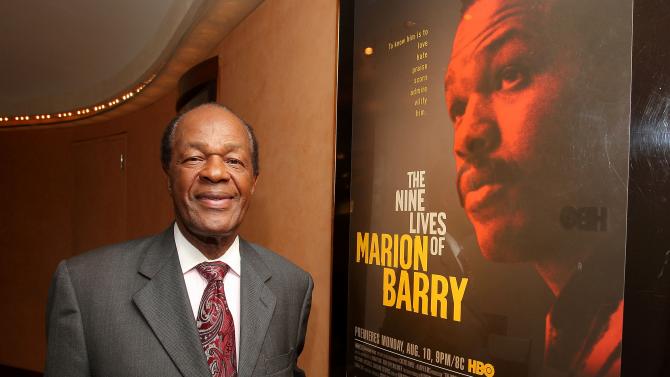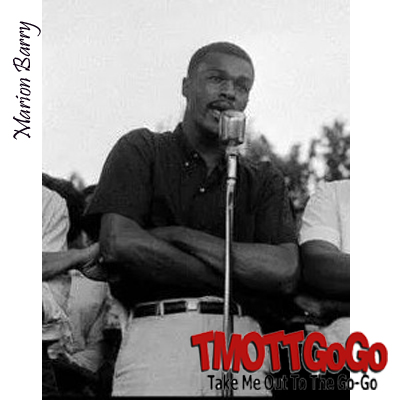
In his new book, Mayor for Life: The Incredible Story of Marion Barry Jr., Barry details his fall into cocaine and what the drugs cost him, plus the legacy he wishes he had.
It’s the 1980s and cocaine is being sucked up the nostrils of some of the world’s elite. Mayor Marion Barry is at an exclusive party in the nation’s capital on 11th Street Northwest.
A woman has been hitting the bathroom all night, so he figures she is bumping coke. He has been to parties before and seen this scene unfold, these types of trips to the bathroom, the insistent sniffing afterward. He knows that if cocaine is here, he shouldn’t be. But two things are working well this night: The woman is dope and he has been drinking.
She hits the bathroom and toots up, then walks out and turns to him. “That’s some good s–t. You want some?” she asks him. “This makes my p–sy hot.”
That is how D.C. lost its second black mayor.
The pretty, unnamed woman with the addiction would pass Marion Barry a business card with coke at the tip. Caught inside a Hennessy-and-cola-induced pretty-woman-sex-driven-I-run-this-city haze, he took a hit.
That is how the habit started, and for years he would chase that high that made him feel like he had “ejaculated,” until it led him to the Vista Hotel, the FBI and his infamous line “The bitch set me up.”
The sting and the spectacularly vivid public downfall of the mayor smoking crack went viral without the Internet. It appeared on newspapers, magazines and T-shirts alike. Thanks to the recent crack-smoking antics of Toronto Mayor Rob Ford, Barry’s story has gained a second life. The sordid tale of that night at a hotel, with the woman and the crack pipe, has become the story that Marion Barry has been trying to rewrite ever since his arrest.
Barry hopes his new book, Mayor for Life: The Incredible Story of Marion Barry Jr., will help set the record straight on what he considers a publicly embarrassing moment in a lifetime of struggle by a righteous man who makes no apologies for his indignant crusade fighting injustices against black people.
“Hundreds of interviews, hundreds of stories, hundreds of photographs, have been done about Marion Barry,” he told The Root. “They all deal with the ‘what’ of Marion Barry, but none of those articles deal with the ‘who’ Marion Barry really is. So I decided to put it down in my own words, the ‘who.’ That I was born poor and black in the Delta of Mississippi to parents who were sharecroppers who made three to four thousand dollars a year before my mother said, ‘I’m tired of that.’ ”
“I’m Tired of That”
That could have been the name of Barry’s book, which was just released.
It has been 24 years since the night in 1990 when Barry walked into the Vista to meet Hazel Diane “Rasheeda” Moore and walked out in handcuffs. Twenty-four years since he put that pipe to his lips and inhaled. Twenty-four years since the former mayor-turned-Ward 8 councilman has had to talk about what that meant to him and the city. And for that, Barry says he has made amends: “I have apologized to the city. I have apologized to the nation. I apologized to my son Chris. We are a nation of second chances.”
Barry’s list of second chances started long before his post-Vista rehabilitation crusade. In March 1977, during his second term as a councilman-at-large, Barry was on his way to his council chamber offices. A security guard warned that something was going on on the fifth floor and that Barry needed to be careful.
As soon as Barry stepped off the elevator, he was shot. A group of Hanafi Muslims had taken some 13 hostages in the district building. They were angry about what they felt was mistreatment by the government. Barry just happened to be in the wrong place at the wrong time. The media made him out as a hero.
“I remember one of the news reporters saying, ‘That’s a crazy way to get elected mayor,’ ” he writes. “I wasn’t even thinking about becoming mayor at that moment; I was only thinking about being alive.”
It was a tragic moment that, with the media’s help, built a mystique around the already enigmatic Barry, who at the time was known for his brash ways, Afro, dashiki and ability to speak both the language of the government and the language of his people.
What most people didn’t know was that under that dashiki for a short period of time, Barry sometimes carried a gun.
Mayor for Life
 Ken Cummins, a Washington City Paper Loose Lips columnist, created the “mayor for life” moniker, and it was never meant to be a good thing.
Ken Cummins, a Washington City Paper Loose Lips columnist, created the “mayor for life” moniker, and it was never meant to be a good thing.
“I didn’t intend for it to be positive,” Cummins told the Washington Post. “It was meant to be satirical—not flattering. It was a spoof, basically saying that we would never get rid of this guy … in another world or another culture, he’d be dictator.
But the name stuck, and there is a truth to the title. Barry is still sought out for political endorsements; there are several ’80s babies who were saved from the streets through his Mayor Summer Youth Employment programs (I am one of them). There is a reason the economically disadvantaged in Ward 8 still consider him a hero, because Barry is loved—and not despite his misdeeds, but because of them.
His failings as a husband and as a person made him closer to them than any policy ever could. He wasn’t too big not to fall into the trap of drugs in a city crippled by drugs. Even his response, “G–damn, the bitch set me up,” somehow made him more man, less politician. Someone they could relate to.
There are two truths that should be pointed out here. The first is that black people overwhelmingly believe that law-enforcement institutions aren’t above corruption, and the second is that this doesn’t mean Marion Barry was not at fault.
Barry believes that the FBI not only set him up but also wanted to kill him. He claims that he was too powerful a moving force in the black community, and that as such, the FBI was not going to stop until he was dead.
“That was the first time in history where they allowed someone to inhale a substance,” he writes. “Usually they would barge in before you inhaled. So they wanted me to overdose on some potent stuff. And they pushed it on me. You can see it on the tape.”
But Barry admits he shouldn’t have been there that night, in that room with Rasheeda Moore, who was working with the FBI to bring Barry to the hotel. Barry claims that he would find out later that the FBI even babysat her kids while she was participating in the sting.
Mary and Barry
Growing up hearing his name called in a rapid-fire D.C. slang, I always thought folks were referencing two people: “Mary and Barry” is how he was known to me until one day I saw his name spelled on the news. It never hit me that this figure, this polarizing icon of D.C. history, was all one man.
It is still shocking that at 78 years old, Barry is just as charismatic, charming and confident as he ever was. He is part preacher and part pimp. He is compassionate in his storytelling of how his mother sent him out to get switches for lying, and endearing when he mentions his son Chris’ recent 34th birthday. He is touching when he notes that God saved him that day in ’77 when the bullet was inches from his heart, and most compelling when he writes about his childhood in the Mississippi Delta.
He is convincing when he mentions that he wants his book to be educational and that it’s a triumph of spirit, and you can see the pulpit form around him as he says, “If you are knocked down, look up; and if you look up, you can get up; and if you can get up, you can go up.”
But there is a disingenuous feel to parts of his story, a mashup of truths that don’t seem feasible.
While he states clearly that he was fully aware of cocaine in the ’80s, he is floored when he arrives at the Vista, almost dumbfounded to see that there is crack (crack!).
He dismisses his first marriage to Blanche Evans in a sentence, and makes his marriage to Effi sound like a sitcom: he as the befuddled mayor who can’t seem to keep it in his pants, and she as the strong black woman made of understandings and hymnals.
He will claim that the media was hunting him down, even creating situations that had him cheating on his wife, and then note that he ” … got involved with women who sometimes were not good for me.” and justify this by explaining that, ” … as a man, you get involved with women anyway because you still have human needs: emotional, physical, spiritual, intellectual.”
But that is the Mary to his Barry that comes with the show. Somewhere in the words and the wisdom of it all, you find yourself 15 bucks lighter than when the conversation started, but content that you got what you paid for. That is magic of Marion Barry. He is a master politician even when he isn’t running for office.
“I don’t want my life and legacy to be about what happened to me at the Vista hotel,” he writes. “That is why it was so important to write this book. I want people to know all the details of my life and the battles I’ve won for so many thousands of poor, underrepresented and left-out black folks in America.”
The book will have a life of its own. People will have their opinions about the man and his legacy, but Barry would like a few words, his words, to be written on his tombstone when that day comes.
“That I cared deeply,” he said, “and that I shared the gift that God gave me.”
Stephen A. Crockett Jr. is associate editor of news at The Root. Follow him on Twitter.

Subscribe to our eblast Newsletter and stay Up-To-Date and In-The-Know with the latest News, Events and Ticket Give-A-Ways!
